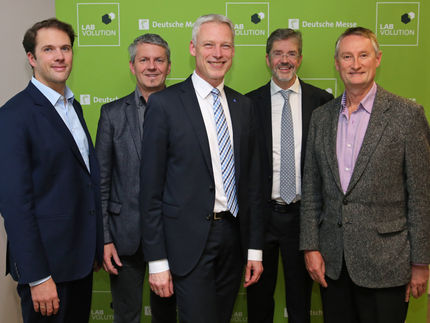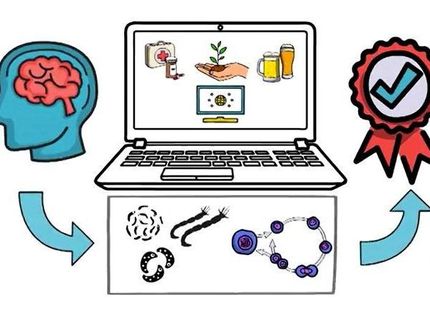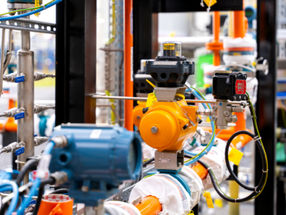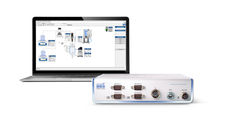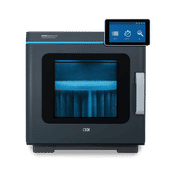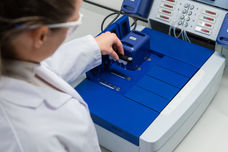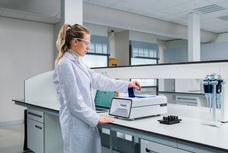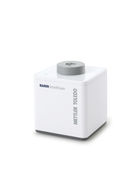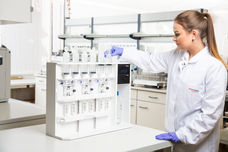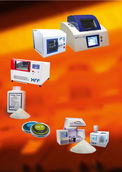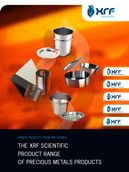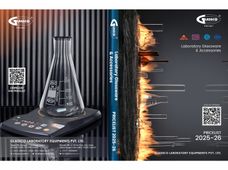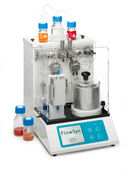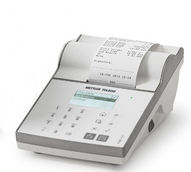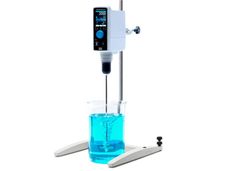Sartorius Reviews Fiscal 2013 Results
Advertisement
The Sartorius Group closed fiscal 2013 with significant gains in sales revenue and earnings. At the annual press conference in Goettingen, Group CEO Dr. Joachim Kreuzburg emphasized that the company not only achieved all financial targets, but also has successfully moved forward with its Sartorius 2020 growth initiative: "In the bioprocess Solutions Division, we further expanded our portfolio for the biopharma market by bolt-on acquisitions and own product development. In the Lab Products & Services Division, we launched a number of promising new product series and at the same time we phased out a few non-strategic product lines. By this focusing of our offering we sharpen our positioning as a premium supplier to lab customers."
Sartorius expects significant profitable growth for the current year as well. Management projects sales to grow approximately 8% to 10% in constant currencies and the company's underlying EBITDA margin to further increase. Based on its strong growth prospects, Sartorius is planning to make considerable investments in the expansion of its global capacities, with a focus on the Group’s headquarters in Göttingen, Germany. "We are launching a multi-year investment program to extend our headquarters, and are planning to unify our two plants at a single site and to build a central Sartorius Campus." This program includes new instrument manufacturing facilities, development and demonstration labs for new products, as well as areas for internal and external teams to work on interdisciplinary projects. "We are expanding significantly and, at the same time, are striving to create an open and dynamic working environment for our employees, customers and business partners," said Kreuzburg. Framework planning for these facilities was finalized and initial construction work has already begun.
Dynamic growth of sales revenue and order intake
In fiscal 2013, Sartorius generated consolidated sales revenue of 887.3 million euros, up from 845.7 million euros a year ago. This equates to an increase in constant currencies (cc) of 7.7% (reported: 4.9%). The gain in Group order intake was also strong, climbing 8.0% (reported: 5.2%) to 912.3 million euros.
Accounting for more than half of consolidated revenue, the Bioprocess Solutions Division continued on track: It posted strong sales growth of 11.9% (reported: 9.2%) to 517.8 million euros and a surge in order intake by 17.4% (reported: 14.6%) to 549.7 million euros. This excellent expansion was driven by all product segments. Cell culture media business acquired in December 2012 contributed approximately two percentage points to the division's sales growth.
Sales revenue for the Lab Products & Services Division rose 2.4% (reported: -0.5%) to 267.4 million euros. Without the phase-out of a few non-strategic product lines, this figure would have been around two percentage points higher. The soft market environment in Asia at the start of the year had a dampening effect on business, which slightly picked up, however, as the year progressed. Order intake was at 263.6 million euros relative to 282.0 million euros a year earlier (constant currencies [cc] -3.7%; reported: -6.5%); the portfolio impact on this figure was around minus three percentage points.
After a difficult first quarter, Industrial Weighing, the smallest Group division, showed positive development during the further course of the year. For the full year, its sales revenue rose 2.4% (reported: -0.7%) to 102.0 million euros. At 99.0 million euros, order intake for Industrial Weighing was slightly below the prior-year figure (cc: -3.1%; reported: -6.0%).
Regionally, Sartorius achieved the highest sales growth in Asia, up 10.3%. Business in this region was driven primarily by high demand for single-use products and equipment used in biopharmaceutical production. In the European market, which accounts for around half of Sartorius' business, sales revenue rose 8.5%. All divisions reported gains in this area. Seen against the background of strong growth in the previous year, sales revenue for the North American region grew more moderately, gaining 2.6%. (All regional figures are given in constant currencies.)
Further increase in consolidated profit
Again in fiscal 2013, Sartorius further expanded its profitability. Its underlying EBITDA rose overproportionally by 7.1% to 172.6 million euros, despite negative currency effects. The corresponding earnings margin climbed from 19.0% to 19.5%.
Mainly driven by economies of scale, earnings contributed by the Bioprocess Solutions Division surged 15.6% to 119.3 million euros, up from 103.2 million euros a year earlier. Its corresponding margin rose from 21.8% to 23.0%. The Lab Products & Services Division posted an underlying EBITDA of
42.9 million euros relative to 45.9 million euros a year ago and a margin of 16.0%, compared with 17.1% in the previous year. Underlying EBITDA for the Industrial Weighing Division was at 10.4 million euros relative to 11.9 million euros a year ago; this corresponds to a margin of 10.1% versus 11.6% in the year before.
Relevant net Profit for the Group was 64.8 million euros, up 2.8% year over year. Its respective earnings per ordinary share amount to 3.79 euros, up from 3.69 euros in 2012, and per preference share, 3.81 euros, up from 3.71 euros in the previous year.
Net operating cash flow nearly doubled from 53.2 million euros in 2012 to 103.3 million euros in 2013. The ratio of net debt to underlying EBITDA was at 2.0 (previous year: 1.9) and, despite the completion of two acquisitions, thus continues to remain at a comfortable level. The Group's equity ratio rose to 38.3%, after 37.8% a year ago.
Research and development expenditures rose
In fiscal 2013, Sartorius invested 53.8 million euros in research and development, 9.7% more than in the previous year. Its ratio of R&D costs to sales revenue was accordingly at 6.1%, slightly more than the prior-year ratio of 5.8%.
Investments in capacity expansions
Whereas Sartorius substantially invested in the expansion of its capacity levels in 2012, it executed on a number of relatively small- to medium-size investment projects in the fiscal year ended. As a result, investments were at 62.9 million euros, down from 74.2 million euros in the year before; the Group's investment ratio was at 7.1%.
Number of employees increased to over 6,000
At the end of the reporting year, the Sartorius Grouop employed 6,058 people, 567 or 10.3% more than a year earlier. This headcount number includes around 200 persons from TAP Biosystems Group plc acquired in December 2013.
Dividends set to rise by around 6%
The Executive Board and the Supervisory Board will submit a proposal to the Annual Shareholders' Meeting on April 10, 2014, to increase dividends to 1.02 euros per preference share (previous year: 0.96 euro) and 1.00 euro per ordinary share (previous year: 0.94 euro). If approved, the total amount disbursed under this proposal would thus rise 6.3% to 17.2 million euros from 16.2 million euros paid out in 2012.
Positive outlook for fiscal 2014
For the current year, Sartorius expects sales to grow approximately 8% to 10% in constant currencies. Its underlying EBITDA margin is projected to further increase and reach about 20.0% relative to 19.5% a year earlier.
Based on its strong growth prospects, Sartorius is additionally planning to invest around 8% to 10% of sales in expansion of capacity and in growth projects.
In view of the three divisions, company management anticipates that sales for Bioprocess Solutions will grow approximately 12% to 15%. Recent acquisitions are expected to contribute approximately seven percentage points to the division's revenue growth. With respect to profitability, Bioprocess Solutions' underlying EBITDA margin is forecasted to rise to about 23.5%.
For the Lab Products & Services Division, Sartorius expects that sales will expand at approximately 1% to 4%. This forecast includes a two-percentage point dilution of sales due to adjustment of its product portfolio. The lab division's underlying EBITDA margin is expected to rise to around 16.5%.
The Industrial Weighing Division projects sales revenue to increase by approximately 1% to 4% and its underlying EBITDA margin to reach 10.5%.
Other news from the department business & finance
These products might interest you
Most read news
More news from our other portals
See the theme worlds for related content
Topic world Weighing
Precise weighing is critical in laboratory and industrial environments. From accurate dosing of chemicals for research experiments to mass production of products, precise weight determination is often the first and most critical step. Modern balances and weighing instruments are sophisticated, offer impressive precision and are resilient to external influences such as temperature and humidity.

Topic world Weighing
Precise weighing is critical in laboratory and industrial environments. From accurate dosing of chemicals for research experiments to mass production of products, precise weight determination is often the first and most critical step. Modern balances and weighing instruments are sophisticated, offer impressive precision and are resilient to external influences such as temperature and humidity.



